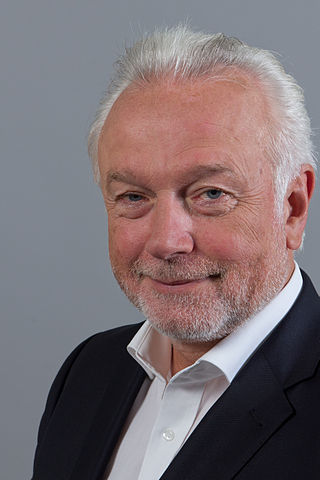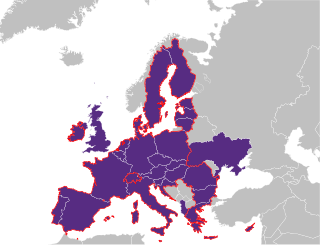
The Liberal Democratic Party of Germany was a political party in East Germany. Like the other allied bloc parties of the Socialist Unity Party of Germany (SED) in the National Front, it had 52 representatives in the People's Chamber.

Hans-Jochen Vogel was a German lawyer and a politician for the Social Democratic Party (SPD). He served as Mayor of Munich from 1960 to 1972, winning the 1972 Summer Olympics for the city and Governing Mayor of West Berlin in 1981, the only German ever to lead two cities with a million+ inhabitants. He was Federal Minister of Regional Planning, Construction and Urban Development from 1972 to 1974, and Federal Minister of Justice from 1974 to 1981. He served as leader of the SPD in the Bundestag from 1983 to 1991, and as Leader of the Social Democratic Party from 1987 to 1991. In 1993, he co-founded the organisation Gegen Vergessen – Für Demokratie. He was a member of the National Ethics Council of Germany from its beginning in 2001.
This article aims to give a historical outline of liberalism in Germany. The liberal parties dealt with in the timeline below are, largely, those which received sufficient support at one time or another to have been represented in parliament. Not all parties so included, however, necessarily labeled themselves "liberal". The sign ⇒ denotes another party in that scheme.

Karl-Hermann Flach was a German journalist of the Frankfurter Rundschau and a politician of the liberal Free Democrats (FDP).
This article gives an overview of liberalism and the historical radicalism movement within liberalism in Switzerland. It is limited to liberal and radical parties with substantial support, mainly proved by having had a representation in parliament. The sign ⇒ means a reference to another party in that scheme. For inclusion in this scheme it is not necessary that parties labeled themselves as a liberal party.

The Social Liberals is a minor social liberal political party in Austria. It has never won a seat in a federal election.
Grand coalition is a term in German politics describing a governing coalition of the parties Christian Democratic Union (CDU) along with its sister party the Christian Social Union of Bavaria (CSU) and the Social Democratic Party (SPD), since they have historically been the major parties in most state and federal elections since 1949. The meaning of the term may change due to the growth of some formerly minor parties in recent years.
Freedom – Civil Rights Party for More Freedom and Democracy, known as The Freedom for short, was a political party in Germany which identified as conservative-liberal and classical liberal. Described as right-wing populist, the party was known for its criticism of Islam.

Wolfgang Kubicki is a German politician of the Free Democratic Party of Germany (FDP) and member of the Bundestag from 1990 until 1992 and 2017 onwards. He has been vice chairman of the FDP in Germany since December 2013. Since 24 October 2017 he has served as Vice President of the Bundestag. From 1992 to 1993 and from 1996 to 2017 he served as chairman of the FDP-group in the Schleswig-Holstein state parliament..

The Ibn Rushd-Goethe Mosque is the only self-described liberal mosque in Germany. It was inaugurated in June 2017, and is named after medieval Andalusian-Arabic polymath Ibn Rushd and German writer and statesman Johann Wolfgang von Goethe. The mosque was founded by Seyran Ateş, a German lawyer and Muslim feminist of Kurdish descent. The mosque is characterised as liberal; it bans face-covering, it allows women and men to pray together, and it accepts LGBT worshippers.

The Party of Humanists is a minor political party in Germany that first participated in the 2017 federal election. It is considered left-of-centre and supports socially liberal and secular policies, such as a federal European state, openness towards technologies such as stem cell research and strict separation between state and religion. The party contested the 2017 and 2021 federal elections, the 2019 European elections and numerous state elections from 2018 onwards. It also contested the 2024 European Parliament election in Germany.

Sascha Vogt is a German politician. From June 2010 until December 2013 he was chairperson of the Young Socialists in the SPD, a division of the German Social Democratic Party.

The 2024 European Parliament election in Germany was held on 9 June 2024. It was the tenth parliamentary election since the first direct elections in 1979, and the first European Parliament election after Brexit.

The Ecological-Left Liberal Democratic Party short-form: ÖLDP, formerly known as the Social Liberal Democratic Party, is a minor party in Germany primarily active in the Hamburger borough of Altona. The party was founded by the former SPD member Bérangère Bultheel in 2012.

Liberal Women are a German individualist women's political organization that was founded in 1990 as an independent association, but has been recognized as the women's wing of the liberal FDP since 1994.

Volt Germany is a social-liberal pro-European, eurofederalist political party in Germany. It is the German branch of Volt Europa, a political movement that operates on a European level.

The Party for Franconia also known as Frankenpartei is a minor party in Germany aimed primarily at people in the Franconian regions of Bavaria.

Ria Schröder is a German politician of the Free Democratic Party (FDP) who has been a member of the Bundestag since 2021.

The FDP Hamburg is the regional state association of the Free Democratic Party (FDP) in Hamburg. It was founded on September 20, 1945, as the first liberal state party in West Germany.

Michael Kruse is a German politician (FDP). From March 2015 to March 2020, Kruse was a member of the Hamburg Parliament. He has been the state chairman of the Hamburg FDP since 25 April 2021.

















